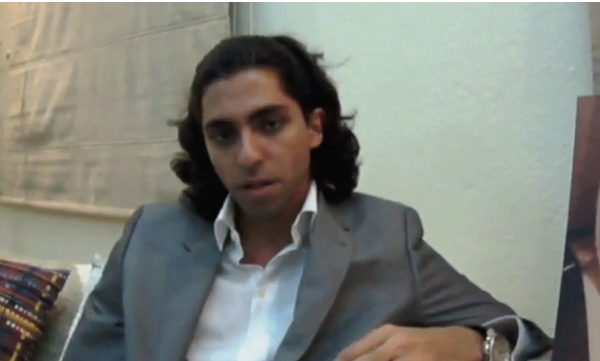29 Oct 2013 | News, Saudi Arabia
 Saudi journalist and blogger Hamza Kashgari, detained for 625 days on blasphemy charges, has been released.
Saudi journalist and blogger Hamza Kashgari, detained for 625 days on blasphemy charges, has been released.
The news was confirmed by Saudi human rights activist Walid Abulkheir, who told AFP: “The authorities freed Kashgari at 6.30 am (0330 GMT)”
This morning, Kashgari himself tweeted: “Mornings of hope…souls that live and never die. Thanks to God.”
The 23-year-old writer was arrested in 2011 when he tweeted a mock conversation between himself and the prophet Mohammed which sparked furious responses, including death threats.
He tried to flee Saudi Arabia, but was detained in Malaysia and deported following a request by Interpol on behalf of Saudi authorities.
Blasphemy is punishable by death in Saudi Arabia.
30 Jul 2013 | Religion and Culture, Saudi Arabia
 Raif Badawi, founder of the Free Saudi Liberals site, has been sentenced to seven years in jail and 600 lashes by a Jeddah court, according to a tweet from his lawyer Waleed Abu Alkhair yesterday
Raif Badawi, founder of the Free Saudi Liberals site, has been sentenced to seven years in jail and 600 lashes by a Jeddah court, according to a tweet from his lawyer Waleed Abu Alkhair yesterday
Badawi’s wife Ensaf Haidar, who now lives in Lebanon, confirmed the sentence to CNN’s Mohammed Jamjoom.
Badawi was arrested in June 2012 for “insulting Islam through electronic channels”. Abualkhair said the conviction was connected to charges of “insulting the religious police” and ridiculing religious figures in the kingdom.
In January, a court had refused to hear apostasy charges against Badawi, concluding that there was no case. Apostasy carries the death sentence in Saudi Arabia.
Among evidence against Badawi was an allegation that he had “liked” an Arab Christian page on Facebook. His lawyer believes he was pursued after calling for a “day of liberalism” in May 2012.
The court has also ordered that Badawi’s website be shut down.
1 May 2013 | Newswire
Preliminary research from a survey of nearly 10,000 Arab respondents has found that while most support the right to free expression online, they are apt to believe that the internet should be regulated, according to the researchers.
The survey — a joint effort between researchers at the Qatar campus of the US-based Northwestern University and the World Internet Project — explored media usage in the Arab world. Participants were drawn from eight Arab nations: Egypt, Tunisia, Bahrain, Qatar, Saudi Arabia, Jordan, Lebanon and the United Arab Emirates.
The survey questioned participants’ perceptions of the news media, finding that 61 per cent thought the “quality of news reporting in the Arab world has improved over the past two years.” Media credibility declined in countries that experienced revolutions during the Arab Spring. The Saudi Arabian respondents gave their media outlets high marks with 71 [per cent agreeing with the statement, “The media in your country can report the news independently without interference from officials”.
Overall, the survey found high Facebook penetration among respondents who used social media. Ninety-four percent of the social media users had Facebook accounts, 47 per cent used Twitter and 40 per cent used Facebook. Among the Bahrain social media users, 92 per cent had a Facebook account, while just 29 per cent of the Egyptian respondents did.
The survey aimed to assess the use of media — TV, radio, newspapers, books, web — and levels of trust respondents had toward the sources. It also sought to guage how the respondents used the internet to communicate and conduct transactions like banking or purchases.
The results can be accessed at Arab Media Use Study.
1 May 2013 | Uncategorized
Preliminary research from a survey of nearly 10,000 Arab respondents has found that while most support the right to free expression online, they are apt to believe that the internet should be regulated, according to the researchers.
The survey — a joint effort between researchers at the Qatar campus of the US-based Northwestern University and the World Internet Project — explored media usage in the Arab world. Participants were drawn from eight Arab nations: Egypt, Tunisia, Bahrain, Qatar, Saudi Arabia, Jordan, Lebanon and the United Arab Emirates.
The survey questioned participants’ perceptions of the news media, finding that 61 per cent thought the “quality of news reporting in the Arab world has improved over the past two years.” Media credibility declined in countries that experienced revolutions during the Arab Spring. The Saudi Arabian respondents gave their media outlets high marks with 71 [per cent agreeing with the statement, “The media in your country can report the news independently without interference from officials”.
Overall, the survey found high Facebook penetration among respondents who used social media. Ninety-four percent of the social media users had Facebook accounts, 47 per cent used Twitter and 40 per cent used Facebook. Among the Bahrain social media users, 92 per cent had a Facebook account, while just 29 per cent of the Egyptian respondents did.
The survey aimed to assess the use of media — TV, radio, newspapers, books, web — and levels of trust respondents had toward the sources. It also sought to guage how the respondents used the internet to communicate and conduct transactions like banking or purchases.
The results can be accessed at Arab Media Use Study.
 Saudi journalist and blogger Hamza Kashgari, detained for 625 days on blasphemy charges, has been released.
Saudi journalist and blogger Hamza Kashgari, detained for 625 days on blasphemy charges, has been released.
 Raif Badawi, founder of the Free Saudi Liberals site, has been sentenced to seven years in jail and 600 lashes by a Jeddah court, according to a tweet from his lawyer Waleed Abu Alkhair yesterday
Raif Badawi, founder of the Free Saudi Liberals site, has been sentenced to seven years in jail and 600 lashes by a Jeddah court, according to a tweet from his lawyer Waleed Abu Alkhair yesterday